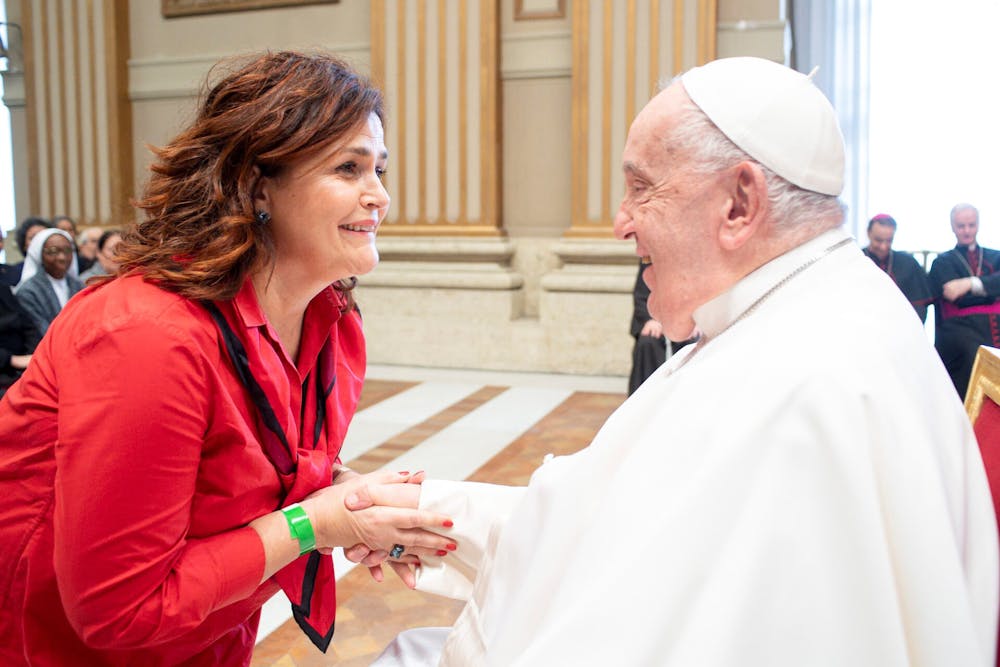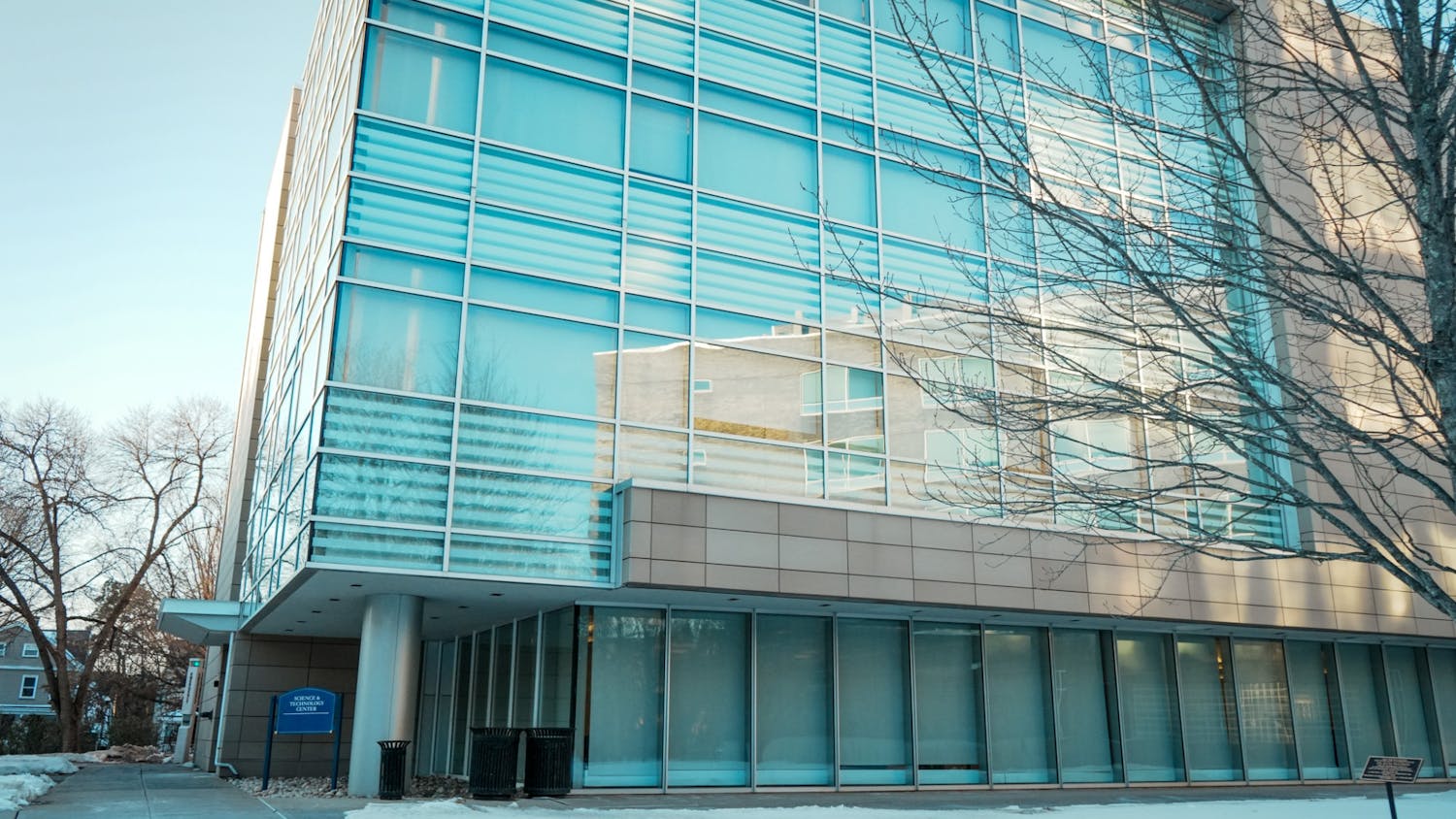As millions worldwide woke up on the morning of April 21, the day after a celebratory Easter Sunday for Catholics, they learned of the news of Pope Francis’ passing.
“Today, our university joins millions of Catholics and non-Catholics around the world in mourning the loss of our Holy Father, Pope Francis,” said Seton Hall University President Msgr. Joseph Reilly in an email to the university community. “Throughout his life—and especially during his papacy—Francis embodied the teachings of our Savior, Jesus Christ.”
The next day, Reilly announced that flags on the South Orange campus would be flown at half-staff.
Pope Francis, the world’s first South American pontiff, had been hospitalized in February after he was diagnosed with pneumonia. He later returned to his home to recover in late March.
He made his last public appearance on Easter Sunday, blessing the public at the Vatican as well as meeting with American Vice President JD Vance.
In the aftermath of Pope Francis’s death, the SHU community came together to reflect on their impressions of the pontiff and how far his impact reached. Many also turned towards the future, expressing their ideas of the qualities they hope to see in his successor.
Prof. Ines Murzaku, professor of religion and director of the Catholic Studies program, had multiple interactions with the late pope. In 2023, she was received in private audience with him, presenting her book in Albanian translation, “Catholicism, Culture, Conversion: The History of the Jesuits in Albania (1841-1946).” Pope Francis himself wrote in the preface of the book.
The most recent interaction between Murzaku and Pope Francis came in December when she attended the International Congress on the Future of Theology.
“I was profoundly moved by the Holy Father’s address and the insights he shared with our group,” Murzaku told shu.edu at the time. “He likened theology to light—a force that works quietly and humbly to illuminate the Gospel of Christ…In our time, the world urgently needs the guidance and illumination that theology can provide.”
Murzaku also discussed Pope Francis’s ties with SHU as a whole with The Setonian.
“As for Seton Hall, we have a special connection with Pope Francis—our Department of Catholic Studies has the Apostolic Blessing of Pope Francis, making it the first university in the U.S. to receive such an honor,” Murzaku said. “So Pope Francis, his vision and mission for Catholic education will live in us.”
Former SHU president, Msgr. Richard Liddy, also had a unique connection to Pope Francis.
“I once made a trip with the Chesterton Institute here at Seton Hall,” Liddy said. “The trip was to Buenos Aires, Argentina, and one day we had a mass with the archbishop of Buenos Aires, and that was the man, Jorge Bergoglio, who would become Pope Francis.”
Though Liddy never had a direct conversation with Pope Francis, he had a positive impression of the pontiff.
“I like him very much,” Liddy said. “He is a wonderful man, wonderful pope, and great person.”
Prof. Jo Renee Formicola, professor of political science, had a strong relationship with the Vatican, providing commentary for Pope Francis’s last visit to America in 2015 for NBC. She was also featured on CBS News last month to discuss the immediate effects of the pope’s death.
Reflecting on him and his work as the pope, Formicola said she thought Pope Francis had accomplished great things.
“He was a very forward-thinking person who tried to recognize the importance of humanity in the work that he did for both church and state,” Formicola said.
Maeve Hartley, a freshman nursing student, said she appreciated Pope Francis’s time as head of the Catholic church, except for one issue.
“I think his priorities were in line with what the Catholic church requires in the 21st century, but I never understood why he placed restrictions on the Latin mass, especially because I know people who go to it and feel most comfortable with worshiping that way,” Hartley said. “I suppose that was the only action I disagreed with.”
Matthew Gerken, a freshman diplomacy major, said that he sees Pope Francis in a different light now that he has passed.
“I think I misunderstood him a lot,” Gerken said. “I feel that a lot of what I perceived was shaped around a lot of the media, and I didn’t care to necessarily look at what he actually would say.”
Now, he said he can see the positive impact Pope Francis had on converting others to Catholicism.
“I saw the benefit [of his actions] this Easter because there were a record number of baptisms,” Gerken said. “I think that’s important. If we want to survive in the future, then we need to attract more people. Opening that door with hospitality is a great way to do it.”
Within his legacy is an impact on Catholic higher education, according to Murzaku.
“Pope Francis insists that a Catholic university cannot be reduced to an exchange of instructional services or the simple delivery of curricula,” she said. “Authentic education must be invigorated by a deeper ‘passio caritatis’—a burning zeal for wisdom that transcends utilitarian or transactional approaches.”
Murzaku emphasized that the church establishes the teachings, the pope upholds them, and universities interpret them.
“The church’s teaching is one,” Murzaku said. “The dogma does not change with the popes. The popes are not elected to change doctrine, instead to pass it along. However, we as a Catholic university, will find new ways, new insights to interpret and innovatively apply the deposit of faith.”
Formicola said she believes that one of the most profound ways Pope Francis influenced education was his warnings about the use of generative artificial intelligence.
“He has written quite a few things about using AI and what it means from a moral perspective,” Formicola said. “He talks about the special relationship between teachers and students, and he says the important thing to remember is that we’re all human. We can do things in our relationships with students and students with their teachers that they can’t do with a machine.”
Greg Tobin, an instructor in the School of Theology, was also featured on CBS News after the news of Pope Francis’s death broke. He said he believes that any successor will continue to positively influence education.
“The pope is the Bishop of Rome and universal pastor of the church, and Seton Hall is a leading, very prominent Catholic diocesan university—so through our president, Msgr. Reilly, and our archbishop, Cardinal [Joseph] Tobin, we have a very direct line to and from the Holy Father, who will no doubt be very involved in Catholic higher education,” Greg Tobin said.
Finding a successor for Pope Francis was a decision made during the recent conclave, which determined that the former Cardinal Robert Francis Prevost would be the 267th leader of the global church and the first pontiff from the U.S. on May 8. Cardinal Tobin was present at the conclave and helped to elect the new Pope Leo XIV.
“It is a very deliberate, serious and spiritual process infused with history and tradition—perhaps the most important aspect is that the cardinals pray to and seek the inspiration of the Holy Spirit to make the right choice for the church in our time,” Greg Tobin said.
Liddy said he hopes the new pontiff will follow Pope Francis’s non-violent ideology.
“Pope Francis was very pro-immigrant…and he certainly was a man of faith and a man of goodness, so he didn’t approve of violence in any way,” Liddy said.
However, Gerken said he hopes the next pope embodies some of the qualities that Pope Francis may have lacked.
“I want to see more clarity,” Gerken said. “I think Francis’s biggest problem was that he would be too ambiguous on certain things. Not that he wasn’t smart enough, but I don’t think he was the best at delivering a message.”
For Hartley, she said she wants the next pope to remain strong in the morals of the church.
“I would like to see our next pope keep the interests of the Catholic Church at the forefront of his decisions,” Hartley said. “Basically, for him to not sacrifice his interests to appease a government or the public.”
Formicola said she hopes that Pope Francis’s successor helps create unity for Catholics globally.
“I think what they’re all looking for is somebody who is able to do what Francis did and what needs to be done in the future, which is really to bring the church closer together,” Formicola said.
For students who wished to pay respects to Pope Francis, the university organized a service on April 26 in the chapel.
“Forever, he will continue to teach and bless us, as he did on that first day in St. Peter’s Square,” Reilly said in his message to the university community. “And as he asked us on that day, we will continue to pray for him, our church, and the world.”
Disclaimer: This article was published later due to scheduling issues. Thank you for your patience.
Kaelyn Blizard is a writer for The Setonian’s News section. She can be reached at kaelyn.blizard@student.shu.edu.





